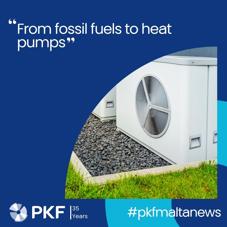From fossil fuels to heat pumps
Author: Lina Klesper - Legal Assistant at PKF Malta
Published on Times of Malta: 11th October 2023

In the ongoing global effort to combat climate change and reduce greenhouse gas emissions, Europe has been at the forefront of adopting sustainable and environmentally friendly technologies.
One key initiative in this endeavour is the replacement of oil-burning home heaters with heat pumps. While this shift is a crucial step toward a greener future, it presents distinct challenges, especially in older homes with limited space for heat pump installations.
The European Green Deal, introduced in December 2019, outlines the European Union’s ambitious plan to achieve carbon neutrality by 2050. Central to this initiative is the reduction of greenhouse gas emissions, including those stemming from residential heating systems.
A significant strategy to attain this goal is the substitution of oil-burning heaters with heat pumps. Heat pumps are highly efficient heating and cooling systems that harness heat from the air, ground or water and transfer it indoors, providing warmth in winter and cooling in summer.
Unlike oil-burning heaters, which release carbon dioxide and pollutants, heat pumps generate no direct emissions, making them pivotal in the transition to cleaner energy sources.
While the advantages of heat pumps are evident, retrofitting older homes with these systems poses challenges. Many older European houses were designed with conventional boilers or oil-burning heaters in mind and lack the requisite space and infrastructure for heat pump installations, which can be considerably larger.
Consequently, retrofitting a house for heat pumps can be a costly endeavour, involving structural and heating system modifications. Insufficient insulation in older homes further complicates heat pump efficiency, adding to the already high installation costs.
The EU is on a clear mission to accelerate heat pump deployment and is sending a strong policy signal with its ongoing legislative work such as a phase-out by 2029 of stand-alone boilers.
However, resource and financing issues, particularly in the context of energy poverty, emerge. To address this, an EU Heat Pump Action Plan was created, encompassing communication and skill strategies with an emphasis on collaboration between the commission, member States, the sector, financial institutions and training providers.
The plan also outlines financing strategies at individual, local and regional levels. One promising funding source is the €86.7 billion Social Climate Fund, set to assist vulnerable households, which will be available to EU member States in 2026.
Germany, known for its commitment to renewable energy and environmental sustainability, has been a leader in the transition from oil-burning heaters to heat pumps.
The German government offers various incentives and subsidies to homeowners who make the switch, making it more financially attractive. Additionally, there is a strong emphasis on energy-efficient building standards, further encouraging the adoption of heat pumps.
In contrast, Malta’s situation regarding the replacement of oil-burning heaters differs from many other European countries. Most Maltese homes lack central heating systems, relying instead on electricity for warmth. While some households use traditional wood-burning stoves, electric heating is more prevalent.
The absence of widespread central heating infrastructure makes the transition to heat pumps a more viable option for many Maltese households.
Perhaps the energy minister, Miriam Dalli, could issue a consultation paper to interested stakeholders on how to introduce heat pumps for heating and cooling in hospitals, clinics and schools such that there is less reliance on conventional electric heaters or air conditioners, possibly using renewable energy rather than electricity produced by burning fossil fuels.
The drive to replace oil-burning domestic heaters with heat pumps in Europe is a significant stride toward reducing carbon emissions and achieving the European Green Deal’s objectives.
While retrofitting older homes presents challenges, the environmental benefits and long-term cost savings make it a worthwhile endeavour.
Germany’s proactive stance sets an example of leadership in the pursuit of a sustainable future. Simultaneously, Malta’s unique circumstances highlight the diverse approaches necessary to address heating challenges across Europe.
Ultimately, the promotion of heat pumps underscores the continent’s dedication to combat climate change and preserve the environment
Author: Lina Klesper - Legal Assistant at PKF Malta
Published on Times of Malta: 11th October 2023
Get in touch: info@pkfmalta.com
